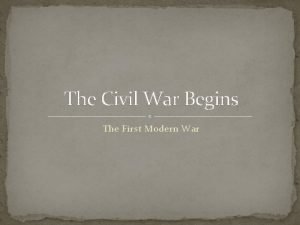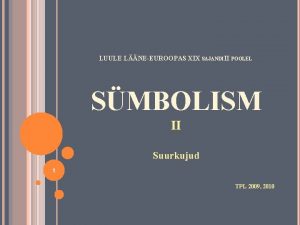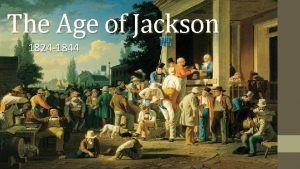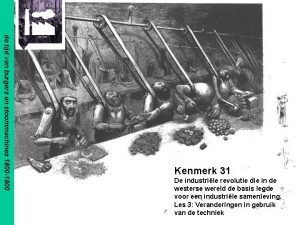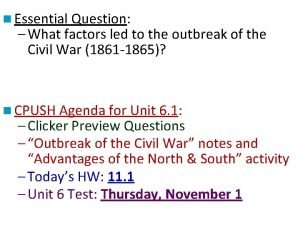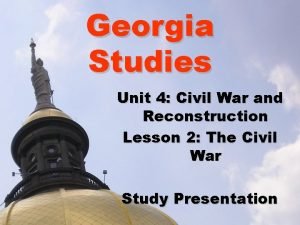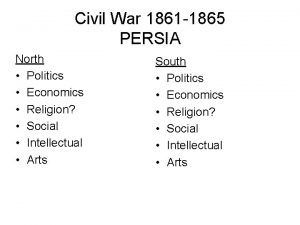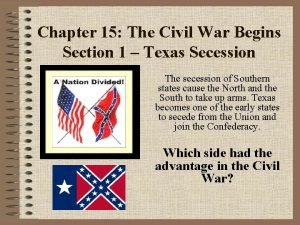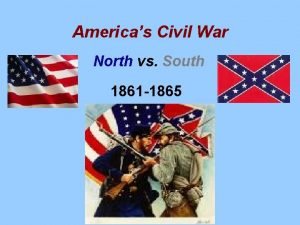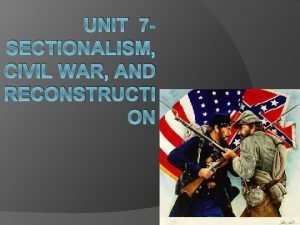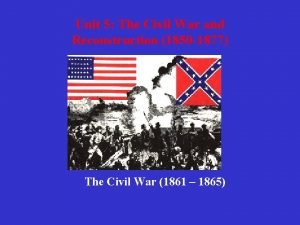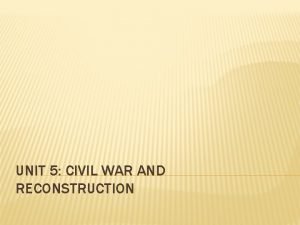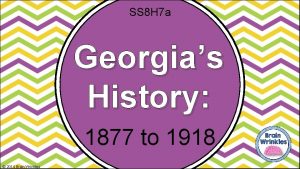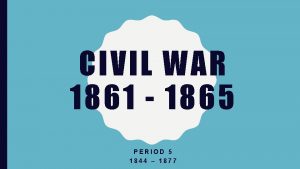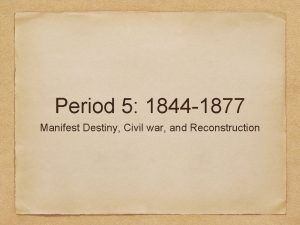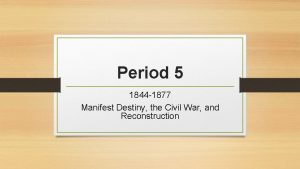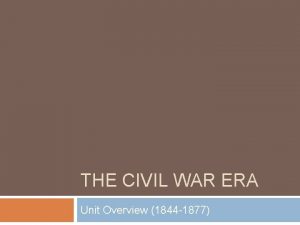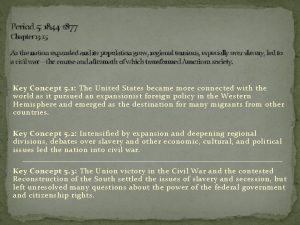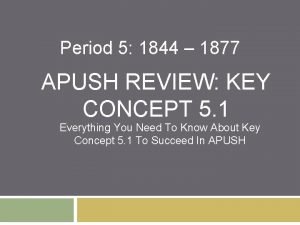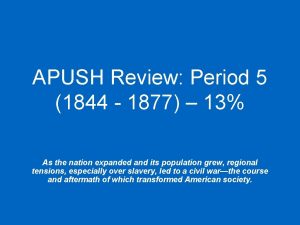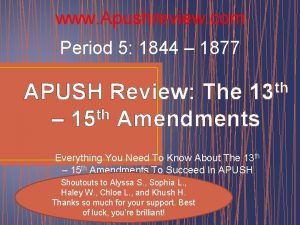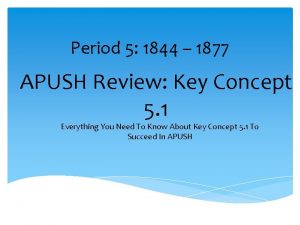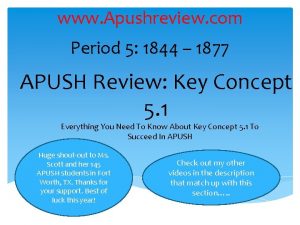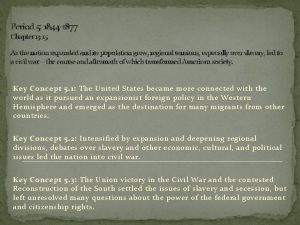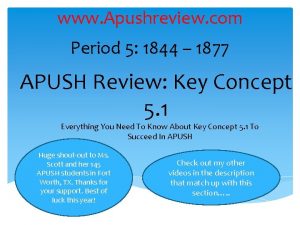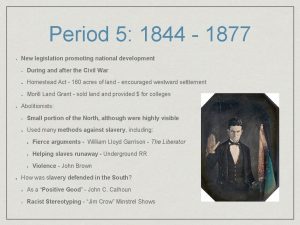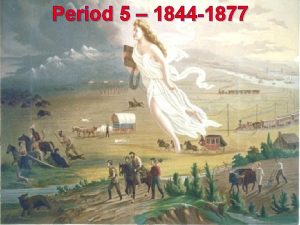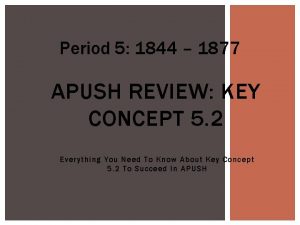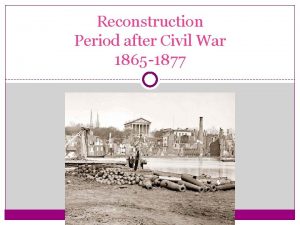Period 5 1844 1877 The Civil War and

























- Slides: 25

Period 5 1844 -1877: The Civil War and Reconstruction Era

Northern vs Southern Society Compromise of 1850 Compromise of 1850

Influential African Americans • Frederick Douglas- escaped slave, gained fame as a gifted writer, speaker and advocate of freedom and equality (published newspaper- The North Star and wrote, Narrative of the Life of Frederick Douglas= Great American autobiographies • Harriet Tubman- escaped slave, but returned to south to help more than 300 slaves escape via the underground railroad • Sojourner Truth- charismatic speaker who campaigned for emancipation and women’s rights • Abolitionists determination and the South’s inflexibility pushed the issue of slavery into the political spotlight

Manifest Destiny Treemap Examples of America Practicing Manifest Destiny Maine Mexico/Texas California Oregon

Wilmot Proviso • Congressional bill prohibiting the extension of slavery into any territory gained from Mexico • Shows sectionalism- Northerners feared new states in west would become slave states • Bill defeated in Congress by vote on sectional lines- North in favor/ South against (all but 2) • Emergence of Free Soil Party- a regional, single issue party devoted to the goals of Wilmot Proviso- wanted to keep the western soil free for white men.

Free Soil Party • Collection of anti-slave Whigs and “Barnburners” – discontented northern Democrats (as opposed to “Fire -eaters”- pro-slavery Southern Democrats) • They did not oppose slavery just on moral grounds. They also said that it destroyed the chances of free white workers from rising up from wage-earning dependence to the esteemed status of selfemployment. • Only way to achieve this upward mobility was to have free soil out west for white settlers • Competing with slave labor meant lower wages for whites and the inability to have social mobility and to own property.

Mexico Conflict • Treaty of Guadalupe-Hidalgo ends Mexican American War – Sets Rio Grand as boundary between US and Mexico – US received Mexican territory from Texas to the Pacific (modern Southwest: Arizona, New Mexico, California, Nevada & Utah), and the US paid Mexico $15 million for the land. =Mexican Cession

Compromise of 1850 • Settlers flooded California (Why? ) and wanted statehood, created a state constitution that prohibited slavery • Originally created by Stephen Douglas (not the African American) and Henry Clay • Compromise of 1850 – Admitted California as a free state – Stronger Fugitive Slave Law – Utah and New Mexico would get popular sovereignty – Abolished the slave trade in Washington DC (but not slavery itself)

Compromise of 1850

Popular Sovereignty • Was left up to territories to decide the slave issue when they wrote the state constitution • Positives: – Was in line with democratic tradition of self-determination – Politicians liked it because it was a pseudo compromise between free-soilers demands for abolition in the territories and also the South’s plea to Congress to allow slavery. – It put the issue of slavery in the hands of the people and removed the government • Negatives: – Most important issue of the day turned into a local issue and not a national issue – Most importantly, the possibility that slavery spread and expanded

Fugitive Slave Law of 1850 • Known as the Bloodhound Bill – Fleeing slaves could not testify on their own behalf – Denied trail by jury – Federal commissioner who handled case got 5 dollars if runaway was freed and 10 dollars if they were not – Northerners who aided a runaway slave were subject to heavy fines and jail sentences

Fugitive Slave Law of 1850 • North was so outraged at the law that it caused many moderates to turn to the abolitionist movement. • “We went to bed one night old-fashioned, conservative, Compromise Union Whigs and waked up stark mad abolitionists. ” • Massachusetts made it a penal offence if any official tried to enforce the new fugitive slave law. • Slave law was bad overall for the South. North became more pro-abolition and they never enforced the law. So South did not gain anything from the compromise.

Harriet Beecher Stowe “So this is the lady who started the Civil War. ” -- Abraham Lincoln

Uncle Tom’s Cabin (1852) • Sold 300, 000 copies in the first year. • 2 million in a decade • Antislavery sentiments in North grew stronger • Damning depictions of plantation life on information provided her by abolitionist friends • Extremely powerful piece of propaganda- awakens people who never gave issue much thought

Averting Sectionalism Compromises or Agreements to forestall Division of the Union 3/5’s comp Great comp Ban international slave trade Mo comp Nullification Gag rule Admitting Texas Comp 1850 Pop sov- K/N Act Dred Scott Critten Comp You may need more braches than are here. 3/5 comp Great Comp Mo. Comp Nullification- comp bill K/N Act Comp 1850 Dred Scott Critten Adm

Kansas-Nebraska Act • Settlers entering Kansas and Nebraska territories found no established civil authority (why is this important? ) • Replaces the Missouri Compromise with the idea of popular sovereignty • Both abolitionists and proslavery groups rushed into the territories so that they could form governments and win the future states for there sides • Just prior to election for Kansas’s legislature, thousands of Missourians relocate to Kansas =Border Ruffians • Gangs from both sides of slavery issue roam the territory attacking the opposition leading to more than 200 people dead. =Bleeding or Bloody Kansas

John Brown • Led a raid on a proslavery camp murdering 5 and starting the violence that becomes Bloody Kansas • Attacked Haper’s Ferry- led a slave revolt on Haper’s Ferry to attain weapons, but attack fails and Brown is excuted for his actions • He will become loved in the North, but hated in the South

John Brown Martyr or Crazy?

Lincoln/ Douglas Debates • Over a Senate seat • Stephen Douglas viewed as leading Democrat in US Senate • Lincoln gained fame as a Whig opposed to the Mexican War and K/N Act • Lincoln delivers his famous house divided speech (“this nation cannot exist permanently half slave and half free) • Douglas destroys his political career over defending popular sovereignty (becomes known as Freeport Doctrine- slavery cannot exist where local laws did not protect it… vote of the people) • Lincoln loses the election for the Senate seat to Douglas

Rise of the Republicans • Kansas/Nebraska Act ends the Whig party • Anit-slavery Whigs + Northern Democrats + Free-Soilers= Republican Party • Republicans dedicated to keeping slavery out of the territories, development of national roads, liberal distribution of Western land, and protective tariffs • Grew quickly in the North (Why/ Reason? )

Election of Abraham Lincoln • From humble beginnings • Democratic party split over issue of slavery – North voted for Douglas, South for Breckinridge • Lincoln wins based off the split and his overwhelming support in the North • Three months before Lincoln’s inauguration, South Carolina seceded from the Union- next few months 6 more seceded and form Confederate States of America • Jefferson Davis becomes CSA President

Start of the Civil War • Lincoln will maintain control of federal forts in the south after succession • The Confederacy will attack Fort Sumter in April, 1861 and officially start the Civil War • Missouri, Kentucky, Maryland Delaware were slave states that fought for and remained loyal to the Union • Northerners fought to preserve the Union • Southerners fought for their States’ rights to govern themselves and maintain their way of life

Important Generals North • Ulysses S. Grant South • Robert E. Lee • William Sherman • Stonewall Jackson – AKA The Butcher – Wins the war at the cost of his Men – Sherman’s march to the sea, he will travel down through the south and burn towns and fields as he goes – Best general of the war – Respected by both north and south – Well respected general by his men – Killed during battle at Vicksburg, Lee will say that the southern army never got over his loss

Important Battles • Anaconda War strategy- North will try to encircle the South slowly cutting off their supplies • Gettysburg- Turning point of the war, Northern victory and they will go on the offensive, South never gets back on Northern soil • Antietam- Bloodiest single day of war ever for the US – The loss of Southern troops and the strength the North showed prevented the British and French governments from helping the South – Lincoln used the opportunity to launch the Emancipation Proclamation

Lincoln During the War • Found that the Civil War required active and prompt presidential action • Lincoln suspended the writ of habeas corpus – Took away protections of unlawful imprisonment • He will issue the Emancipation Proclamation as a war necessity because constitutionality it would be questioned • Federal officials ordered the suspension of certain newspapers and arrested editors • WHAT DOES THIS SHOW? –Be able to answer
 Chapter 16 lesson 2 challenges to slavery
Chapter 16 lesson 2 challenges to slavery Why was the civil war the first modern war
Why was the civil war the first modern war Prantsuse poeet 1844-1896
Prantsuse poeet 1844-1896 1844 room buckingham palace
1844 room buckingham palace The age of jackson 1824-1844
The age of jackson 1824-1844 Prantsuse poeet 1844-1896
Prantsuse poeet 1844-1896 1844 1910
1844 1910 The age of jackson 1824-1844
The age of jackson 1824-1844 1844 eerste telegraaflijn
1844 eerste telegraaflijn Anjo 1844
Anjo 1844 Joint stock companies act 1844
Joint stock companies act 1844 Civil rights webquest
Civil rights webquest Cotton diplomacy
Cotton diplomacy Unit 4 civil war and reconstruction
Unit 4 civil war and reconstruction Civil war and reconstruction study guide
Civil war and reconstruction study guide Civil war advantages and disadvantages chart
Civil war advantages and disadvantages chart Civil war advantages and disadvantages chart
Civil war advantages and disadvantages chart North and south states civil war
North and south states civil war North and south states civil war
North and south states civil war Chapter 6 civil war and reconstruction
Chapter 6 civil war and reconstruction Remembering world war 1 achieve 3000
Remembering world war 1 achieve 3000 Ppt
Ppt Unit 5 civil war and reconstruction
Unit 5 civil war and reconstruction Reconstruction vocabulary words
Reconstruction vocabulary words Guernica 1936
Guernica 1936 1877 to 1918 cloze notes
1877 to 1918 cloze notes

